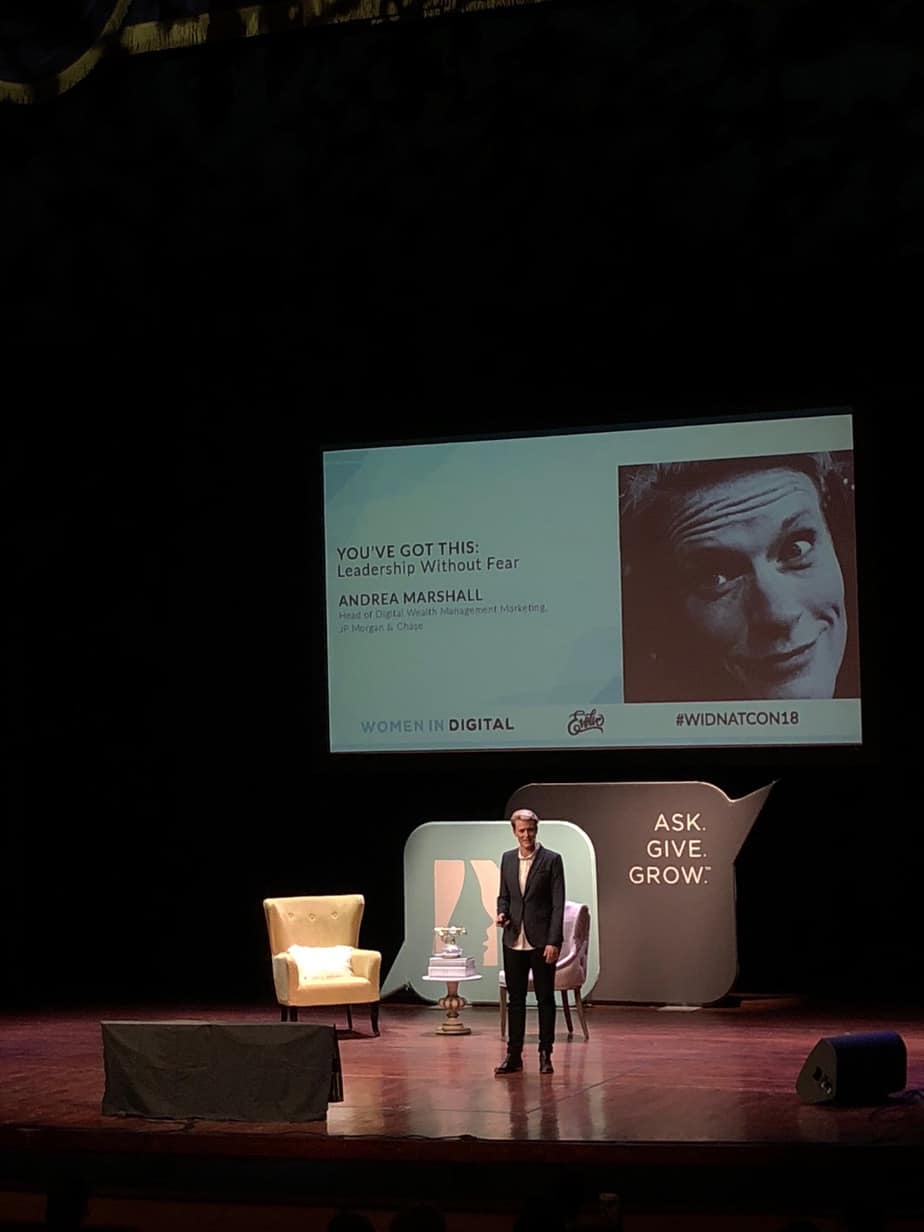
Leadership is more than just a job; it’s a responsibility. A big responsibility. There have been countless talks and presentations and lectures on how to be a good leader. So many people talk about leadership, but they typically don’t mention a vital aspect: Past screw-ups. With two decades of leadership under her belt, Andrea Marshall wasn’t afraid to discuss this topic with her audience during the Women in Digital 2018 Conference last week.
“I’m really going to be focused on being real,” she began. “I’m going to talk about a different side of leadership…a side that’s maybe not so glamorous and a little more necessary for success…I’m going to talk a little about the things I did wrong.” She went on to explain that while leaders love to share their successes, they rarely share their missteps. And those missteps, she pointed out, are just as important as the successes.
Marshall went on to detail her recent experience leaving Columbus, Ohio to start a new job in New York City. Leaving Ohio, she felt fearless. She was ready to tackle the new job in a new city and be a successful leader, just like she had been in the past. Well, that didn’t happen right away. She eventually found success with her company (and rang the NYSE bell with her team just last week), but the road there wasn’t bump-free. Here’s what she learned during her journey:
Take risks despite the unknown.
“Here I was, taking this opportunity, but most importantly, I was actually taking on a lot of risk,” Marshall explained when talking about her choice to relocate to NYC. “Despite the unknown…here I was leaving the place that I had comfort in…heading off to the big city to chase my dream,” she said. She soon found herself hit hard by reality. Everything was foreign, from the lifestyle to her new company. She felt ambushed. But, Marshall didn’t leave and head back to her comfort zone. She adapted and evolved. “I learned really quickly it’s important for me as a leader to adapt my style and not expect an organization or a group of people to adapt theirs for me. I changed my perspective and looked at it with a fresh pair of eyes,” Murray concluded. Despite her discomfort with the unknown, she allowed herself to learn from it. In her words, she allowed herself to “integrate slowly and evolve.”
Be a diplomat not a politician.
In her new workplace, politics definitely had a presence, and this was something new to Marshall. Her leadership style had always been people-focused and team-oriented; she never was interested in the politics game. In her new leadership role, she found herself surrounded by politics. Marshall realized she wasn’t going to have success with that company if she didn’t figure something out. Rather than jump in with the status quo, she took her own approach. “I just changed my perspective on what politics is really all about,” she explained. She focused on being a diplomat rather than constantly striving to get ahead personally. Her job was to be there for her team, her people, not necessarily making her way up the ladder. This not only made her more comfortable in that environment, it made her a better leader.
It’s not personal.
Marshall admitted that in her early days in NYC, she was often close to tears. Whether it was a heated discussion in the boardroom, a battle with colleagues, or harsh words from the CEO, she found that things were hitting her hard, that she was taking things personally. She soon began questioning herself: “Do I belong in this role? Do I belong at this level? Do I belong in this city? Am I out of my range here?” she wondered. Marshall eventually realized, “It’s never about me…People are just about the business." It had nothing to do with her not being smart enough or qualified enough. It was a different work culture. “It’s not personal, and I shouldn’t be taking it personal,” she explained. “They care about the business and want the project to be successful.”
Don’t take people’s sh*t.
At her new organization, Marshall realized that not standing her ground, letting others prey on her weaknesses, and showing fear, would have a big impact on her success. She knew she would have to stand her ground to maintain her respect as a leader. But if she did, would she be labeled as rebellious? A loose cannon? Or worse, a bitch: what she considers one of the worst things that can be said about a woman at the leadership level? But then she shifted her thinking. “The one thing I didn’t think about, all of these perceived fears, the one thing I didn’t think about was, what if it gives me a voice at the table?” she told the audience. And she found that it did. “You’ve got to prove your worth, especially as women. You have to set a precedence early on for how you allow people to treat you and how you allow people to behave.” Marshall was able to cement her role as a respected leader by insisting she be treated with respect.
Marshall ended her talk by adding that along with mistakes, fear is a significant part of being a leader. Like mistakes, without fear, a leader can’t reach full potential. “Fear is real, and it’s necessary,” she concluded. “Smart leaders maintain a healthy balance of fear and being fearless. Fear makes us think and calculate our decisions…it’s a really necessary thing.”
By focusing on topics like mistakes and fear, Marshall shed light on aspects of leadership that aren’t often discussed, especially on a big stage. Her focus on being real no doubt gave her audience of over 500 professionals a clearer picture of leadership today and how they can better prepare themselves to be the leaders of tomorrow.
